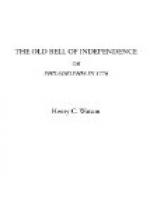“The regiment to which Major Barton was attached, was commanded by Colonel Stanton, a respectable and wealthy farmer in Rhode-Island, who, in the spirit of the times, had abandoned the culture of his farm and the care of his family, and put at hazard his property and his life in defence of his country. To this gentleman Major Barton communicated his plan, and solicited permission to carry it into execution. Colonel Stanton readily authorized him ’to attack the enemy when and where he pleased.’ Several officers in the confidence of Major Barton were then selected from the regiment for the intended expedition, on whose abilities and bravery he could rely:—these were, Captain Samuel Phillips, Lieutenant Joshua Babcock, Ensign Andrew Stanton, and John Wilcock. (Captain Adams subsequently volunteered his services, and took an active part in the enterprise.) These gentlemen were informed by Major Barton, that he had in contemplation an enterprise which would be attended with great personal hazard to himself and his associates; but which, if success attended it, would be productive of much advantage to the country. Its particular object, he stated, would be seasonably disclosed to them. It was at their option to accept or decline his invitation to share with him in the dangers, and, as he trusted, in the glory that would attend the undertaking. The personal bravery of Major Barton had been previously tested; and such was the confidence and esteem which he had acquired among the officers under his command, that, without insisting upon a previous developement of his plans, his proposal was immediately accepted. Major Barton experienced more difficulty in obtaining the necessary number of boats, as there were but two in the vicinity. But this difficulty, though it caused a few days’ delay, was at length obviated, and five whale-boats were procured and fitted for service. Major Barton had purposely postponed procuring the necessary number of men until the last moment, from an apprehension that their earlier selection might excite suspicion, and defeat the object of their enterprise. Desirous that this little band might be composed entirely of volunteers, the whole regiment was now ordered upon parade. In a short, but animated address, Major Barton informed the soldiers that he projected an expedition against the enemy, which could be effected only by the heroism and bravery of those who should attend him; that he desired the voluntary assistance of about forty of their number, and directed those ’who would hazard their lives in the enterprise, to advance two paces in front.’ Without one exception, or a moment’s hesitation, the whole regiment advanced. Major Barton, after bestowing upon the troops the applause they merited, and stating that he required the aid of but a small portion of their number, commenced upon the right, and, passing along the lines, selected from the regiment, to the number of thirty-six, those who united to bravery and discipline a competent knowledge of seamanship,




